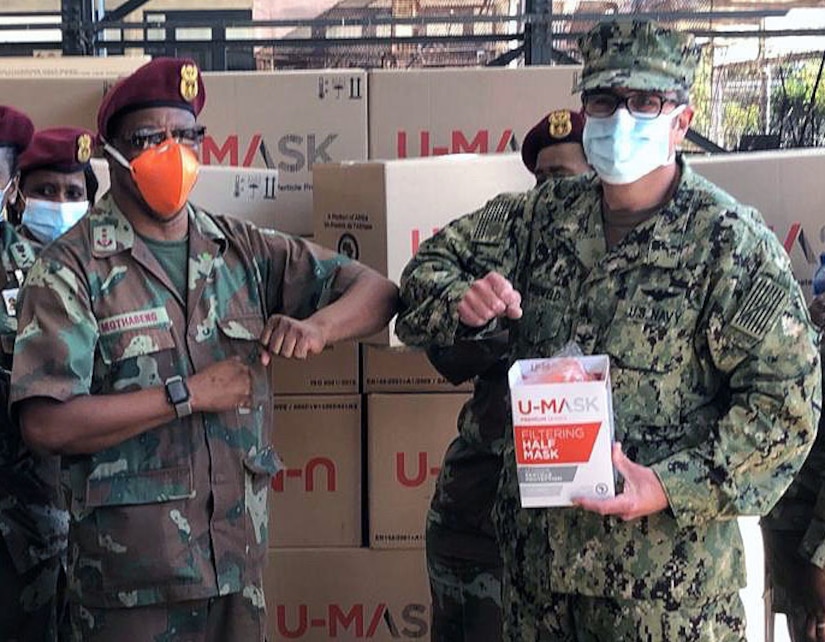May 1, 2020 | BY David Vergun , DOD News
''In my visits to Africa, I've had the opportunity to meet
several of our partners in places such as Ghana and Benin,'' said the deputy
assistant secretary of defense for African Affairs.
''I've also had the opportunity to meet rising leaders from
our partner militaries, such as Tunisia – including a recent graduate of the
U.S. Air Force Academy,'' said Peter Marocco. ''I've also had the honor to see
some of our troops on the continent and I can tell you, our partnership remains
strong, and fueled by our shared interests and values. It is shored by quality
exchanges that build mutual capacity and readiness.
''The U.S. military's commitment to our partners is vast –
taking many forms,'' he continued, adding that the department employs an array
of cooperative activities, including training, support to bilateral and
multilateral dialogues, exercises, security cooperation and intelligence
sharing.
''We plan to maintain engagement across a wide spectrum of
activities to address terrorist threats on the continent,'' he said. ''We will
continue to work by, with, and through local partners and allies to combat
transnational threats and minimize the malign influence of non-African
powers.''
The National Defense Strategy reinforces partner-centric
strategies and approaches to strengthen our partners' defense capabilities, he
noted. ''We will continue to use a variety of tools to work closely with
African and other international partners to achieve several policy goals
including capacity-building programs, security assistance, military equipment
sales, education and exercises.''
Last year, 567 African partners were trained in U.S.
military schools through the State Department's International Military
Education and Training Program. That number of students represented 29% of the
global total in this program, according to a U.S. Africa Command statement,
April 30. This year’s training, however, was interrupted by the COVID-19
pandemic.
The statement mentioned some of the many cooperative
activities the department is and has taken with African partners:
- DOD provided COVID-19 humanitarian assistance to partner nations in U.S. AFRICOM's area of responsibility, including: laboratory consumables to Ethiopia and Ghana; test kit reagents to Guinea; personal protective equipment to South Africa; transfer of PPE to laboratory technicians in Rabat, Morocco; and, field hospitals and ambulances to Ghana, Mauritania, Senegal and Uganda.
- The Armed Forces Health Surveillance Branch is developing COVID-19-specific surveillance projects with several African nations, including Kenya, Tanzania and Uganda, to understand how the disease is spreading or decreasing via herd immunity.
- On Jan. 22, the department turned over a new C-130 hangar to Nigeria's air force. Construction was funded by the State Department and was built by local citizens and other workers.
- On Jan. 23, DOD delivered six MD-530F Cayuse Warrior helicopters to Kenya's army.
- In February, about 1,600 service members from the U.S. and 30 African nations participated in Exercise Flintlock 2020 throughout Mauritania and Senegal. Later, scheduled exercises with a number of nations were canceled because of COVID-19 concerns.
- On March 15, the destroyer USS Carney conducted a port visit to Cape Town, South Africa, to help build maritime safety and security partnership with that nation's navy.
- In cooperation with the government of Somalia, DOD has conducted 39 airstrikes this year, as of April 28, against al-Shabaab terrorists, as well as their fighting positions, infrastructure and equipment.
- This summer, DOD is planning to train Nigerian Air Force pilots and maintenance personnel on the A-29 Super Tucano aircraft at Moody Air Force Base, Georgia.
There are currently about 6,000 DOD personnel, including
military, civilians and contractors in U.S. Africom's area of responsibility.
Of those, about 3,000 are at Camp Lemonnier, Djibouti. The rest maintain a
presence at 11 non-permanent cooperative security locations, ready to provide a
crisis response if needed.
Also, the National Guard has a State Partnership Program,
whereby select U.S. states conduct military-to-military engagements with
specific nations aligned with those states.
Similar humanitarian work is being done by DOD across all of
the other combatant commands around the globe.

No comments:
Post a Comment